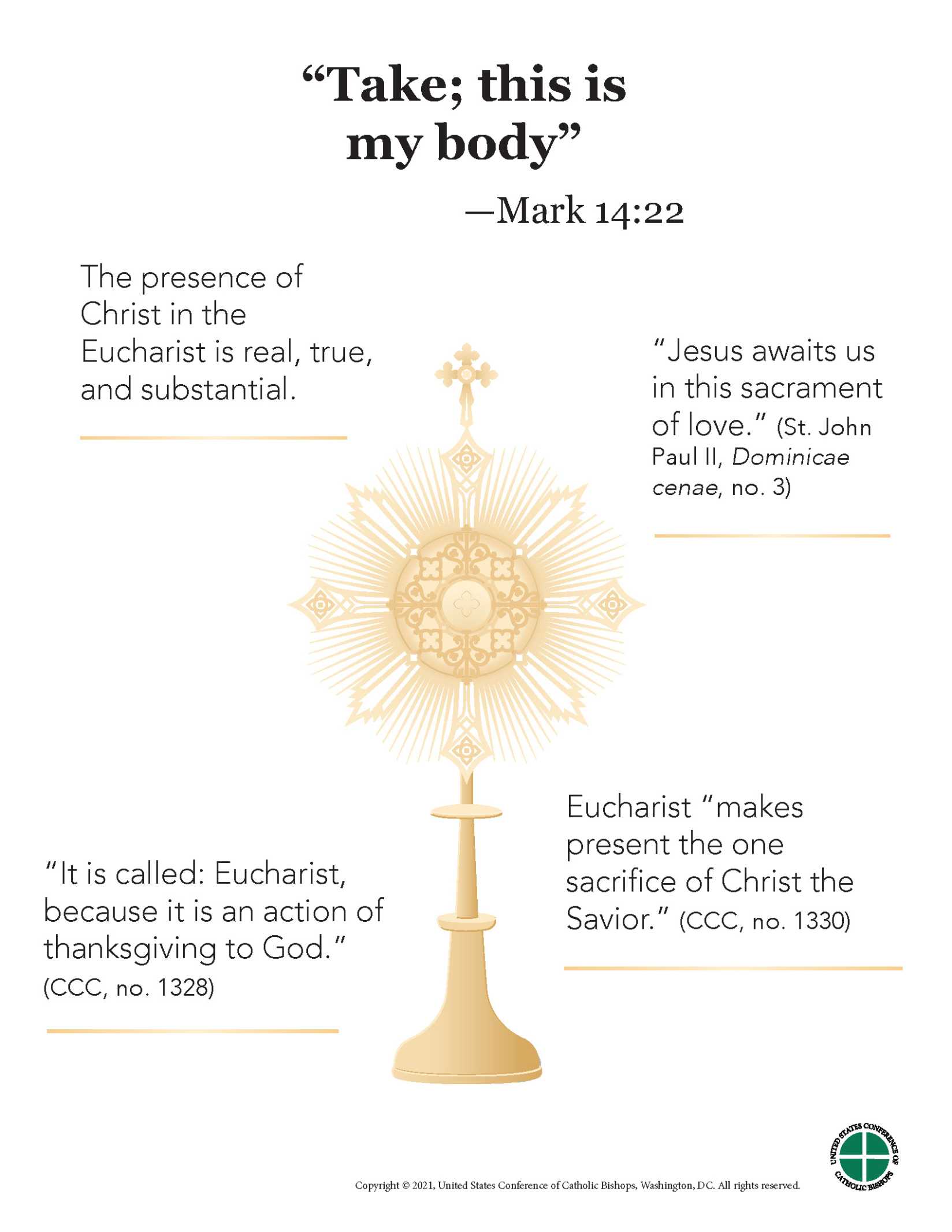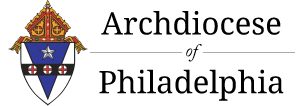
In the celebration of the Eucharist, bread and wine become the Body and Blood of Jesus Christ
through the power of the Holy Spirit and the instrumentality of the priest.
The whole Christ is truly present — body, blood, soul, and divinity —
under the appearances of bread and wine, the glorified Christ who rose from the dead.
This is what the Church means when she speaks of the “Real Presence” of Christ in the Eucharist.
Where is the Eucharist mentioned in the Bible?
The Lord Jesus, on the night before he suffered on the cross, shared one last meal with his disciples. During this meal our Savior instituted the sacrament of his Body and Blood. He did this in order to perpetuate the sacrifice of the Cross throughout the ages and to entrust to the Church a memorial of his death and resurrection. The Institution of the Eucharist is written down in the four Gospels below:
The Eucharistic Prayer
The Eucharistic Prayer is the heart of the Liturgy of the Eucharist. In this prayer, the celebrant acts in the person of Christ as head of his body, the Church. He gathers not only the bread and the wine, but the substance of our lives and joins them to Christ’s perfect sacrifice, offering them to the Father.
The introductory dialogue establishes that this prayer is the prayer of the baptized and ordained, is offered in the presence of God, and has thanksgiving as its central focus. Following this dialogue, the celebrant begins the Preface, which consists of four different Eucharistic Prayers. After these prayers, communion is then given.
The following timeline follows the traditional Liturgy of the Eucharist:
- Presentation of the Gifts and Preparation of the Altar
- Prayer over the Offering
- Eucharistic Prayer
- Preface
- Holy, Holy, Holy
- First half of prayer, including Consecration
- Mystery of Faith
- Second half of prayer, ending with Doxology
- The Lord’s Prayer
- Sign of Peace
- Lamb of God
- Communion
- Prayer after Communion
By his Real Presence in the Eucharist Christ fulfils his promise to be with us “always, until the end of the age” (Mt 28:20). As St. Thomas Aquinas wrote, “It is the law of friendship that friends should live together. . . . Christ has not left us without his bodily presence in this our pilgrimage, but he joins us to himself in this sacrament in the reality of his body and blood” ( Summa Theologiae, III q. 75, a. 1). With this gift of Christ’s presence in our midst, the Church is truly blessed. As Jesus told his disciples, referring to his presence among them, “Amen, I say to you, many prophets and righteous people longed to see what you see but did not see it, and to hear what you hear but did not hear it” (Mt 13:17). In the Eucharist the Church both receives the gift of Jesus Christ and gives grateful thanks to God for such a blessing. This thanksgiving is the only proper response, for through this gift of himself in the celebration of the Eucharist under the appearances of bread and wine Christ gives us the gift of eternal life.
Amen, amen, I say to you, unless you eat the flesh of the Son of Man and drink his blood, you do not have life within you. Whoever eats my flesh and drinks my blood has eternal life, and I will raise him on the last day. For my flesh is true food, and my blood is true drink. . . . Just as the living Father sent me and I have life because of the Father, so also the one who feeds on me will have life because of me. (Jn 6:53-57)
Catholic News Service
Vatican II Documents on Religious Life
| Perfectae Caritatis: Decree on the Adaptation and Renewal of Religious Life |
| Lumen Gentium: Dogmatic Constitution on the Church |
| Lumen Gentium: Dogmatic Constitution on the Church, Chapter VI “Religious” |
https://www.vatican.va/roman_curia/congregations/ccscrlife/documents/rc_con_ccscrlife_doc_20180401_cor-orans_en.html
Eucharistic Revival

Diocesan Eucharistic Symposium
Archbishop Charles J. Chaput, archbishop emeritus of Philadelphia, Eucharistic Symposium at the Cathedral of St. Thomas More in Arlington Oct. 22. ZOEY MARAIST | CATHOLIC HERALD
ZOEY MARAIST | CATHOLIC HERALD
Americans are inundated with commercials and it is altering our mindsets, said Archbishop Chaput. “It amounts to a university education in greed, self-absorption and impossible expectations that end in anxiety and resentment,” he said. Some industries, such as gambling, use knowledge from the behavioral sciences to create dependency by design, he said.
“In the name of serving consumers, we’ve permanently addicted consumers to a river of new goods and services,” said Archbishop Chaput. “Now we have millions of people who live artificially restless and dissatisfied lives and our economy depends on keeping them that way. We don’t allow ourselves to think through the logic of our own economic machinery because we don’t want to deal with the burdens of reforming the way we live.”
Catholics, too, are participants in this culture. “We fit in but in the process, we’ve been digested and bleached out by the culture rather than becoming a leavening in a fertile way with a distinctive Catholic witness,” he said. “President Biden’s apostasy on the abortion issue is only the most repugnant example. When you freely break communion with the church of Jesus Christ and her teaching, you cannot pretend to be in communion when it is convenient. That’s a form of lying.”
This materialistic state of mind can keep us from the sacred, said Archbishop Chaput. “The same Jesus Christ is alive among us right now in every celebration of the Mass, in our tabernacles and in our adoration chapels. Many Catholics no longer really believe that,” he said. “So many of us live so much of our lives in a kind of half-conscious, narcoleptic haze of distraction, anxieties and anesthetics. The supernatural and miraculous seem remote and impractical.”
The solution is a real encounter with Christ. “There’s an antidote to that narcolepsy, and it begins by simply reading from the first verse in Matthew to the last verse in Revelation. It’s impossible to read the word of God without encountering God’s presence,” he said. “Every conscious, personal encounter with the sacred lifts us up out of ourselves into the transcendent beauty of God’s creation, and that’s why a materialist culture based on relentless commerce works so hard to choke us with distractions and noise and to drag us back down to the horizontal world.”
Remembering God’s presence in the world and giving thanks for his many gifts is a revolutionary act, he said. “As Joshua said to the tribes of Israel so long ago, we need to choose this day which God we will serve,” he said. “If we remember who we are as a believing people and choose well, then we and those we love and the wider world we’re called to sanctify will be the better for it.”
St. Thomas Aquinas
O merciful God,
grant that I may desire ardently,
search prudently,
recognize truly,
and bring to perfect completion
whatever is pleasing to You
for the praise and glory of Your name.
Amen.
St Thomas Aquinas, 13th-century Dominican friar and Doctor of the Church, is well-known for his prodigious work, the Summa Theologiae. He is not, however, well-known for his prayers, and perhaps he should be. Of course, some of the prayers he wrote may be more familiar than you think—a few are used today for Adoration and Benediction of the Blessed Sacrament: the O Salutaris Hostia and Tantum Ergo both came from his hand, as well as the collect for Benediction: “O God, who in this wonderful Sacrament . . . ”
But he wrote more prayers than these, and they, too, are beautiful! Above is the beginning of just one of these—it is said that he prayed this prayer before the image of Christ every single day, begging the Lord for grace and wisdom.
As we work for the promotion and defense of the truth about marriage, and as we teach others about the goodness of God in giving himself to us in the sacraments, and as we thank him for the gift of marriage, let us follow the Angelic Doctor in praying these beautiful words. Let us pray that God may transform our hearts, strengthen and encourage us in our trials, and bring us at last to that land where there is “the cheerfulness of spring, the brilliance of summer, the fruitfulness of autumn, and the gentle repose of winter,” that “life without death and that joy without sorrow where there is the greatest freedom, unconfined security, secure tranquility, delightful happiness, happy eternity, eternal blessedness, the vision of truth, and praise, O God” (from another of Aquinas’ prayers). St Thomas Aquinas, pray for us!
For Ordering a Life Wisely
O merciful God, grant that I may desire ardently, search prudently, recognize truly, and bring to perfect completion whatever is pleasing to You for the praise and glory of Your name.Put my life in good order, O my God.Grant that I may know what You require me to do.Bestow upon me the power to accomplish Your will, as is necessary and fitting for the salvation of my soul.Grant to me, O Lord my God, that I may not falter in times of prosperity or adversity, so that I may not be exalted in the former, nor dejected in the latter.May I not rejoice in anything unless it leads me to You; may I not be saddened by anything unless it turns me from You.May I desire to please no one, nor fear to displease anyone, but You.May all transitory things, O Lord, be worthless to me and may all things eternal be ever cherished by me.May any joy without You be burdensome for me and may I not desire anything else besides You.May all work, O Lord, delight me when done for Your sake and may all repose not centered in You be ever wearisome for me.Grant unto me, my God, that I may direct my heart to You and that in my failures I may ever feel remorse for my sins and never lose the resolve to change.O Lord my God, make me submissive without protest, poor without discouragement, chaste without regret, patient without complaint, humble without posturing, cheerful without frivolity, mature without gloom, and quick-witted without flippancy.O Lord my God, let me fear You without losing hope, be truthful without guile, do good works without presumption, rebuke my neighbor without haughtiness, and—without hypocrisy—strengthen him by word and example.Give to me, O Lord God, a watchful heart, which no capricious thought can lure away from You.Give to me a noble heart, which no unworthy desire can debase.Give to me a resolute heart, which no evil intention can divert.Give to me a stalwart heart, which no tribulation can overcome.Give to me a temperate heart, which no violent passion can enslave.Give to me, O Lord my God, understanding of You, diligence in seeking You, wisdom in finding You, discourse ever pleasing to You, perseverance in waiting for You, and confidence in finally embracing You.Grant that with Your hardships I may be burdened in reparation here, that Your benefits I may use in gratitude upon the way, that in Your joys I may delight by glorifying You in the Kingdom of Heaven.You Who live and reign, God, world without end.Amen.
[These and other prayers by St Thomas Aquinas can be found in the volume entitled, The Aquinas Prayer Book: The Prayers and Hymns of St. Thomas Aquinas, available from Sophia Institute Press (1-800-888-9344).]
Contact
Sister Gabrielle Mary Braccio, RSM
Delegate for Consecrated Life
222 North 17th Street
Philadelphia, PA 19103-1299
10th Floor Room 1029
Phone: 215-587-3795
Email: [email protected]






